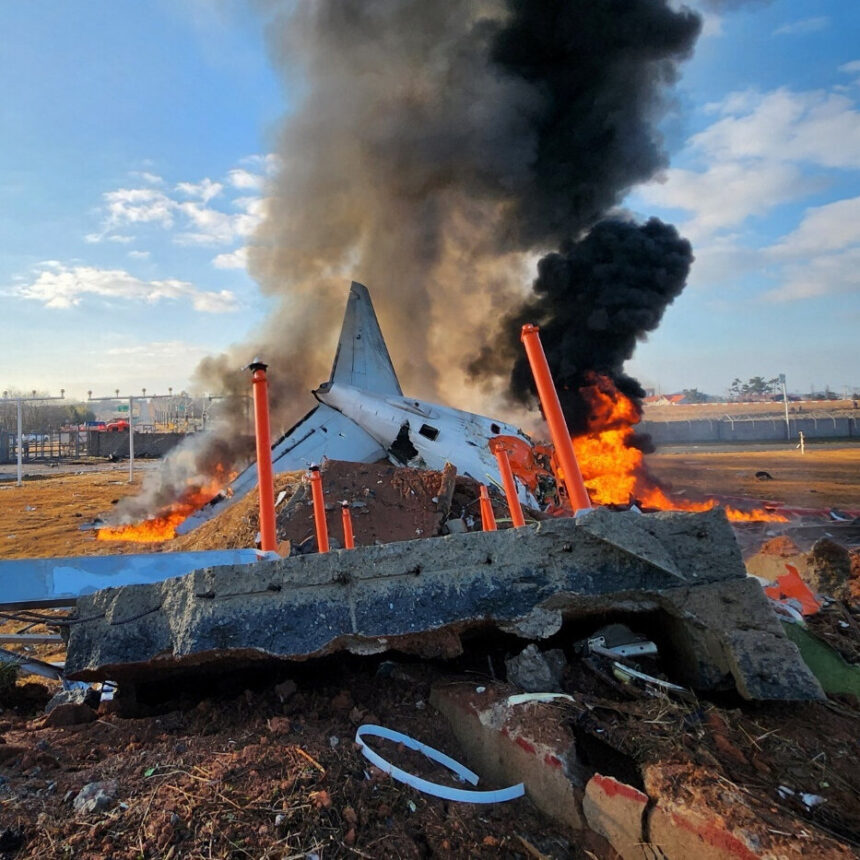South Korea’s Worst Air Disaster: 179 Dead in Jeju Air Crash!
On Sunday, December 29, 2024, a Jeju Air Boeing 737-800 crashed at Muan International Airport in South Korea, resulting in 179 fatalities out of 181 passengers and crew. This incident marks the deadliest aviation disaster in South Korea in decades.
The flight originated from Bangkok, Thailand, and was approaching Muan International Airport when the tragedy occurred. Initial reports suggest that during its landing attempt, the aircraft failed to deploy its landing gear, causing it to skid off the runway and collide with a concrete barrier, leading to a catastrophic explosion.
Investigators are considering multiple factors that may have contributed to the crash. One theory involves a bird strike that potentially damaged the plane’s landing gear and engine. However, aviation experts are skeptical that a bird strike alone could cause such a severe malfunction. They are also examining the aircraft’s speed, flap positions, and braking systems during the landing attempt.
The South Korean government has responded by ordering emergency safety inspections of all Boeing 737-800 aircraft operated by domestic airlines. This move aims to ensure the airworthiness of these planes and prevent similar tragedies in the future.
The identification of victims is underway, with authorities facing the grim task of reconstructing remains from hundreds of body parts recovered at the crash site. Families of the deceased are anxiously awaiting news, many pleading for their loved ones to be “put back together.”
The crash has sent shockwaves through South Korean society, which is already grappling with political turmoil following the impeachments of President Yoon Suk Yeol and Prime Minister Han Duk-soo. Acting President Choi Sang-mok is overseeing the response to this disaster.
Global leaders have extended their condolences. U.S. President Joe Biden expressed deep sorrow and offered assistance in the investigation. Similarly, UN Secretary-General António Guterres conveyed his sympathies to the victims’ families.
The National Transportation Safety Board (NTSB) of the United States is collaborating with South Korean authorities in the investigation. They aim to determine the exact cause of the crash, a process that may take several months. Flight data and cockpit voice recorders have been recovered and will be analyzed for insights into the final moments before the disaster.
Jeju Air has expressed profound regret over the incident. The airline has pledged full cooperation with investigators and is providing support to the victims’ families. In a statement, Jeju Air’s CEO extended heartfelt condolences and assured the public of the company’s commitment to uncovering the truth behind the tragedy.
The aviation community is closely monitoring the investigation, as the findings could have significant implications for airline safety protocols worldwide. The Boeing 737-800 model has a strong safety record, making this incident particularly concerning for industry experts.
In the wake of the disaster, South Korea has declared a seven-day national mourning period. Memorial services are being organized across the country, with citizens paying respects to the lives lost in this unprecedented tragedy.
As the investigation progresses, authorities urge the public to refrain from speculation and await official reports. They emphasize the importance of a thorough and unbiased inquiry to prevent future occurrences and to honor the memory of those who perished.
This catastrophe has reignited discussions about aviation safety standards in South Korea. Lawmakers and industry stakeholders are calling for comprehensive reviews of current regulations to enhance passenger safety and restore public confidence in air travel.
In conclusion, the Jeju Air crash at Muan International Airport stands as a somber reminder of the inherent risks in aviation. The loss of 179 lives has left an indelible mark on South Korea and the global community. As investigations continue, the collective focus remains on uncovering the truth, supporting the bereaved, and implementing measures to ensure such a tragedy never recurs.







